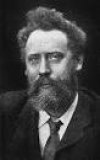Analysis of The Spring, My Dear
William Ernest Henley 1849 (Gloucester) – 1903 (Woking)
The spring, my dear,
Is no longer spring.
Does the blackbird sing
What he sang last year?
Are the skies the old
Immemorial blue?
Or am I, or are you,
Grown cold?
Though life be change,
It is hard to bear
When the old sweet air
Sounds forced and strange.
To be out of tune,
Plain You and I . . .
It were better to die,
And soon!
| Scheme | ABBACDDC EFFEGHHG |
|---|---|
| Poetic Form | |
| Metre | 0111 11101 10101 11111 10101 01001 111111 11 1111 11111 10111 1101 11111 1101 101011 01 |
| Closest metre | Iambic dimeter |
| Characters | 320 |
| Words | 68 |
| Sentences | 10 |
| Stanzas | 2 |
| Stanza Lengths | 8, 8 |
| Lines Amount | 16 |
| Letters per line (avg) | 15 |
| Words per line (avg) | 4 |
| Letters per stanza (avg) | 122 |
| Words per stanza (avg) | 35 |
Font size:
Submitted on May 13, 2011
Modified on March 05, 2023
- 20 sec read
- 125 Views
Citation
Use the citation below to add this poem analysis to your bibliography:
Style:MLAChicagoAPA
"The Spring, My Dear" Poetry.com. STANDS4 LLC, 2024. Web. 27 Apr. 2024. <https://www.poetry.com/poem-analysis/40558/the-spring%2C-my-dear>.


Discuss this William Ernest Henley poem analysis with the community:
Report Comment
We're doing our best to make sure our content is useful, accurate and safe.
If by any chance you spot an inappropriate comment while navigating through our website please use this form to let us know, and we'll take care of it shortly.
Attachment
You need to be logged in to favorite.
Log In